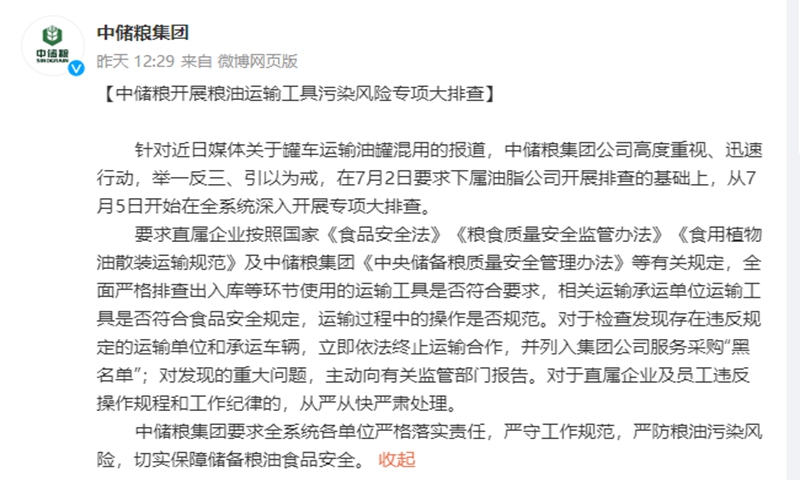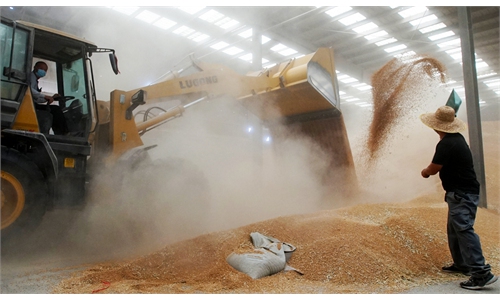Update: Authorities, Sinograin launch in-depth probe after reports of mixed use of tank trucks transporting food and chemical liquids raised concerns

Screenshot of Sinograin's WeiBo account
Both local authorities and China Grain Reserves Group Sinograin have launched a large-scale special inspection after media reports on the mixed use of tank trucks transporting both food and chemical liquids sparked public concern in recent days.
Companies such as Hopefull Grain and Oil Group and China Grain Reserves Oil and Fat (Tianjin) Co., Ltd. have been implicated in this scandal.
On Tuesday, a representative from Hopefull Grain and Oil Group told the Global Times that the company is conducting a thorough self-inspection and more detailed updates are awaiting notification from the publicity department of the city of Sanhe in North China’s Hebei Province where the company is located.
The market supervision authority in Hebei’s Langfang city which administers Sanhe, responded to inquiries from media outlet yicai.com on Tuesday, stating that an investigation into the incident is currently being conducted by the Sanhe city government, with the final investigation results to be made public. Also the market supervision authority in Tianjin was quoted by ifeng.com that the investigation is currently under way and they will inform the society the result in the near future.
On Saturday, China Grain Reserves Oil and Fat (Tianjin), a subsidiary of China Grain Reserves Management Group Sinograin, announced on social media that they have initiated a comprehensive investigation throughout their entire system.
According to Chinese media outlet nbd.com.cn, clients of China Grain Reserves have received notification from the company requesting verification of the sources of the last three loads on their transport vehicles, particularly focusing on the loading records of oil products. One individual described this incident as a "rare occurrence" that touches upon "moral bottom line and basic conscience."
According to a news report by The Beijing News on July 2, a tanker driver revealed the "open secret" in tanker industry of mixed transportation of food and chemical liquids carried on the same vehicles, without cleaning in between cargos.
Many domestic cargo tanker trucks are not fixed to certain liquids, transporting both edible liquids including syrup and soybean oil, as well as chemicals including coal oil, according to the report.
In order to save costs, many operators do not clean the tanks, and edible oil producers do not check the tanks according to regulations, resulting in chemical residue and contamination of edible oil.
According to a statement issued by Sinograin on its official Weibo account on Saturday, all affiliated companies are required to rigorously check whether the transportation tools entering and leaving their warehouses meet the requirements.
Additionally, they are required to examine whether the carriers' transportation tools are in compliance with food safety regulations, and whether the operation meets the relevant standards.
Several e-commerce platforms removed products from the company's brand, Jinding cooking oil, after the company vowed to investigate the incident, but some cooking oil products were later reinstated, according to media outlets.
Many Chinese netizens expressed their concerns about food safety, urged the recall of problematic edible oils, and demanded a thorough investigation and strict punishments for the people responsible.
According to Sinograin's statement, carriers and vehicles found to have violated regulations will face immediate termination of cooperation and will be blacklisted. In cases of major problems, Sinograin will take the initiative to report them to the relevant supervisory authorities.
Companies and employees directly under Sinograin jurisdiction will be punished promptly and strictly if they are found to have violated operating procedures and work regulations.
According to the Beijing News report, China has no mandatory national standards for the transport of edible oils and there is only a recommendation, which stipulated that dedicated vehicles should be used for the transport of bulk edible vegetable oils. Since it is a "recommendation," it has limited constraining force on companies.
However, Wang Xingguo, a professor at the School of Food Science and Technology in Jiangnan University, told the media that the recommendation is mandatory to a certain extent and relevant companies should take this as the baseline when establishing company standards, which can be stricter, but not lower than this standard.

